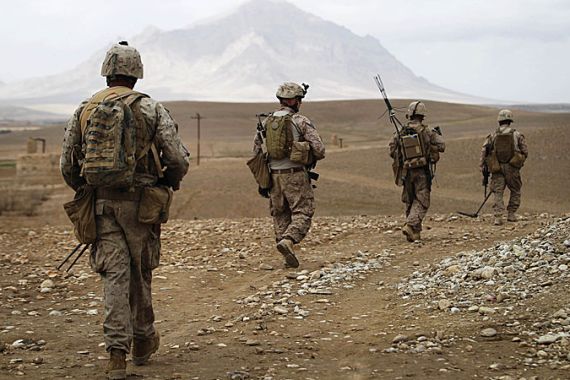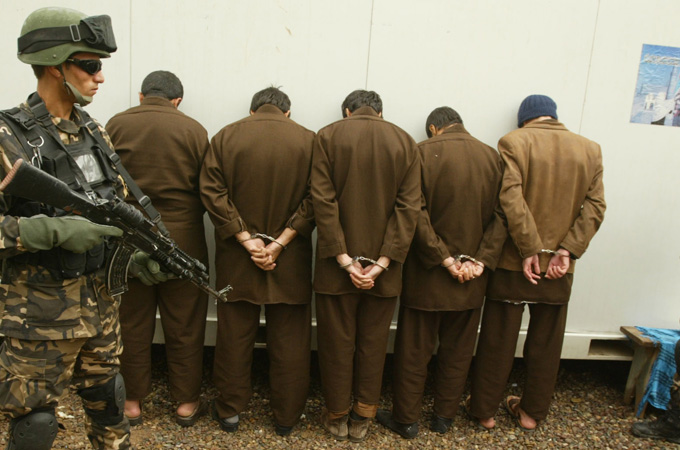Istanbul and the US ‘Peace Process’ for Kabul
Only by completing its draw-down can the US produce a political solution in Afghanistan, author says.

 |
| The US administration has planned on a full pullout from Afghanistan by 2014 – with some exceptions [EPA] |
WASHINGTON DC – It is one of the hallmarks of US diplomacy, discerned over many years of close observation, that when problems become seriously intractable, when there is no clear or acceptable solution in prospect, when the status quo is intolerable, and when it is not politically tenable to simply allow nature to take its course, the US summons its considerable energies, reaches out to the various concerned parties whom it finds both willing and acceptable, and embarks upon… a “process”.
The history of such diplomatic processes, whether devoted to arcane issues of weapons proliferation, trans-national social ills, or some particularly ugly international blood-feud, is unlikely to inspire confidence. Perhaps it is enough to point out that the paradigm for such open-ended diplomatic minuets is what is still referred to, with increasing irony and cynicism, as the Israeli-Palestinian “peace process”.
It can hardly be seen as an encouraging development, therefore, that another such international process, this time devoted to forging a political settlement in Afghanistan, was begun a week ago in Istanbul.
Viewing the proceedings on the surface, one might be tempted to account this confab in Anatolia a raging success. Some 12 regional powers, reinforced by extra-regional “supporters”, such as the US, quickly reached agreement on a protocol for Afghanistan calling for security, reconstruction, health, counter-terrorism and an end to drug trafficking. They also pledged themselves to “respect Afghanistan’s sovereignty, unity and territorial integrity”. Given the document’s level of high-minded abstraction, participants could hardly have declined to sign it. They will meet again in Kabul some nine months hence to begin the process of determining what, if anything, these platitudes might actually mean in practice.
In the meantime, the process of soliciting greater regional and international engagement in Afghanistan will continue full-bore. Another international conference will be held on December 5 in Bonn, with yet broader participation. The following May, NATO will hold a “summit” to assess its progress in off-loading responsibilities to the Kabul government and to a combination of regional powers and other hoped-for foreign patrons of Afghanistan. And shortly thereafter, the round of conferences will begin anew.
It has been my observation that meetings, whatever their stated purpose, generally reflect and reinforce the interests of those who organise them. And for all that these conferences are meant to engage non-NATO countries in determining Afghanistan’s future, the impetus behind them is American. Istanbul, according to a senior Obama administration official, was “part of a process that … will set conditions allowing all US and NATO combat troops” to depart in 2014. That would tend to suggest that the US-NATO drawdown is dependent on “conditions on the ground” set, in part, by the participants in the Istanbul conference. In fact, no such conditionality applies. The US president has made it clear that the US drawdown will continue regardless of events. Thus, this full-bore international diplomatic effort, combined with an internal “process” of progressively handing over security responsibilities to Afghan security forces, is designed to provide a patina of order and respectability to what is, in fact, a re-calibration of US interests and costs in Afghanistan, and the resultant American decision to substantially withdraw.
In a phrase frequently heard around Washington these days, the US is promoting a “victory narrative” for Afghanistan. In his recent pronouncements on the war, President Obama, ever sensitive to the potential charge from domestic opponents that he has “cut and run” from the conflict, is attributing the US retrenchment to the combined success of the US “surge” effort and to the progressive formation of a more capable Afghan Army. In this, the US administration is trying to be too clever by half. Any clear-eyed and knowledgeable observer is aware that a rapid NATO troop withdrawal is likely to result eventually in a re-initiation of civil war in Afghanistan and the increased possibility, at least, of a renewed international terrorist presence. Thus, in the absence of a military solution, the American need for a political settlement is all the more acute, at precisely the time that a rapid US withdrawal is making such an outcome less, and not more likely.
Referring to the process begun in Istanbul, an administration official has recently made clear that “what we want to do is provide an international basis of support for a political outcome in Afghanistan.” Unanimously-signed international declarations notwithstanding, the US hope for useful international engagement in Afghanistan is looking increasingly like magical thinking. All Afghanistan’s neighbours might sincerely support an ideal political outcome which would serve Afghanistan’s interests as well as their own, but there is little hope of such an ideal outcome, and thus little chance that they will put their equities at risk to achieve it. Those, like China and Iran, whose national interests are only marginally engaged in Afghanistan, are unlikely to shoulder the costs which American ambitiousness would dictate. They will instead aim to protect their interests as far more narrowly defined; in the case of Iran, a simple American retreat would suffice. Others, like Pakistan and India, whose interests are far more centrally engaged in Afghanistan, are unlikely to assume the risks associated with support of frankly unlikely outcomes, and thus unlikely to change behaviours which Americans find unuseful.
The US clearly does not intend to abandon Afghanistan. A careful parsing of President Obama’s statements, reinforced by vague NATO pronouncements concerning post-2014 engagement, make clear that the US will retain sufficient military force to preclude a Taliban victory over the Kabul regime, while sustaining its ability to strike at terrorist safe havens on either side of the Durand Line. Real international confidence in American resolve to meet its stated goals in Afghanistan, if there were any, might affect calculations in New Delhi, Islamabad, Miranshah and Quetta in ways useful to American designs. American mendacity in promoting a “victory narrative”, however, is undermining its credibility, raising serious questions about its staying-power, particularly in Taliban and Pakistani minds, and thus placing its aspirations further out of reach.
US Deputy Secretary of State Bill Burns extolled the results of Istanbul as “the first clear, region-wide statement of support for Afghanistan in this time of transition and reconciliation”. Part of his statement was correct. “Transition” in Afghanistan is under way and inevitable. “Reconciliation” is a long way off, and will not be materially affected by the Istanbul process.
In the end, the various players in Afghanistan and the region will conduct themselves on the basis of clear facts on the ground. Once the US has completed its fall-back in Afghanistan, things will find their own level, politically and militarily, and the actors in this drama will craft their policies to suit. Perhaps then, progress toward a political solution can be made. Meanwhile, burdened by the guilty knowledge of their real intentions in South-Central Asia and the reasons for them, the Americans are showing clear signs that their transition in Afghanistan will be far more rapid than previously advertised. Perhaps the best news in Afghanistan is that 2014 is likely to come early.
Robert Grenier was the CIA’s chief of station in Islamabad, Pakistan, from 1999 to 2002. From October 2002 until December 2004, he was the CIA Iraq Mission Manager. He was also the director of the CIA’s counterterrorism centre.
The views expressed in this article are the author’s own and do not necessarily reflect Al Jazeera’s editorial policy.
